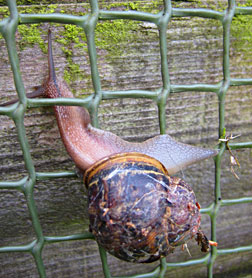Slugs and Snails
Nature of the Problem
Slugs and snails are the bane of most gardeners. Whatever measures you take, you cannot eliminate them or, if you think you have, they soon return with a vengeance.
It's not so much that gardeners have a downer on the creatures themselves. It's the damage they do to garden plants damage that disfigures those plants we grow for their appearance and stunts those we grow for food.
In fact, slugs and snails are probably less prone to damaging our prize plants than we may think. For the most part, their preferred diet is decaying plant material, which is a good thing. It is when there is insufficient decaying material that they turn their attention to soft healthy plants which is perhaps understandable really!
This is why you will often find slugs in the compost bin, where they have a feast on the waste material you are recycling. They are probably not doing much harm in the compost and at least they are not eating your prize plants.
The downside is that they will leave their eggs behind in the recycled material that you plan to spread on your garden. One way to control this is to wait until the compost is ready for use and then spread it out on a hard surface for a few days, which gives the birds an opportunity to find and consume the eggs for you.
Read Also:
Reproduction and Lifestyle

Slugs and snails like to hide away in cool, damp places where they are safe from predators (which includes gardeners). You will typically find them amongst decaying plants, under stones, boards, pots or anywhere that offers protection from sun, rain and wind.
Because they are vulnerable to anything that causes them to lose moisture, slugs in particular prefer to hide during the day and feed after sunset.
Although they like moist places, slugs hate rain and will find shelter. However, once the rain ceases, the conditions are ideal for them to go on a feeding frenzy.
Slugs have no shell (or very small shells in some cases) and no bones so that they are able to secrete themselves in very narrow crevices.
Whilst snails are able to survive through winter by withdrawing into their shells and hibernating, snails don't have such protection and are therefore less likely to survive, other than as eggs.
If your garden is already infested with snails or slugs, then you will want to find ways of removing them. However, the best approach is to discourage them in the first place or at least discourage them from damaging your plants.
Consequently, we first look at methods for prevention and then how to remove them.
